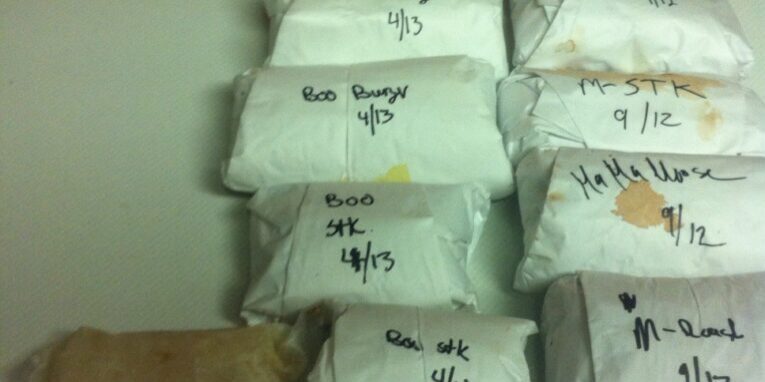We volunteers have been lucky with meat. We’ve been given moose, caribou, salmon, halibut, and soups bulked up with reindeer sausage. So far, it has been a hearty fall.
The unanticipated twist for me is that though I’m eating the best meat of my life, I’m eating far less of it than I used to. The biggest reason is that the other housemates just aren’t as carnivorous. Our habits at the grocery store tend more towards the verdant vegetable aisle than the rosy trough of cellophane swaddled meat. And it’s no real loss. The difference in taste between a pricy pork-chop from the store and a thin slab of free roaming caribou flank is substantial. Whereas I felt a consistent low-level tingle of shame over labor, environmental, and ethical issues wrapped up in industrial meat, I have few qualms with adept hunters killing and butchering free-range tundra beasts.

But I’d never lived in a place with a strong hunting and subsistence culture before, and eating this way is a new option. Its rules are not self-evident: how much people set aside, which cuts and animals are most preferable, reciprocity with meat-giving—all of these are still mysteries to me. What’s more, we volunteers are pretty incompetent and useless: we don’t hunt, own no guns, and can provide only the most basic, unskilled labor if anyone decided it was worth the liability to let us tag along. We are like fawns wobbling unsteadily atop spindly legs, sticky with dew. There is a political vernacular in Alaska to the language around killing animals. Key and contested terms are “subsistence rights,” “hunting,” “harvesting,” “commercial,” “sport,” and so on. Within this loaded lexicon we volunteers deserve our own designation: subsistence moochers.
At an economical and nutritional level, subsistence moochers depend on generosity, which has ceased being an abstract virtue and materialized more than once in the form of a cold block of meat, vacuum-sealed in plastic. We’ve gotten these scrumptious parcels from several persons. Shortly after I’d first arrived, Kelly gave us a giant moose roast that we refashioned into steaks on the grill. Three weeks ago, our friend Will scraped out his freezer and came up with a bushel of different meats neatly wrapped in white butcher paper. So far, a pale chunk of halibut was turned into a garlic-rubbed roast. Ground caribou got converted into meatloaf. For our family meal last Sunday, we seared caribou steaks in our trusty cast-iron on the stove top. Ground moose is going into a vat of chili soon. On Friday I flew to nearby White Mountain, and after eating lunch with my host at his house, his wife unlocked their freezer and handed me two frozen salmon fillets. It was incredibly kind. I shoved it into my leather travel bag, and carried it with me on the plane back to Nome. That night, we subsistence moochers of the KNOM volunteer house ate both flanks, glazed with teriyaki and garlic.

The politics of food and flesh carry a lot of weight in Western Alaska. Fundamentally, the cultural, economic, and governmental tensions involved in legislating subsistence rights are about the provisioning of food. The dismal walrus harvest on St. Lawrence Island, the spreading panic over depleted fisheries and escapement numbers, the anger over mining roads re-routing caribou herds—these are some of the instances I’ve glimpsed that most vividly demonstrate the divergent economic regimes clashing as the cash economy encroaches the terrain of subsistence economies. What I could not have known in the cities back East where I’m from, is that the seemingly minute distinction of buying meat in a store versus harvesting it yourself belies two different stances on political economy that are still alive and kicking off the road system. You can use money to buy food, or bypass money all together by divorcing commerce from consumption and harvesting directly from the land and sea. Not that it’s easy.
For subsistence moochers like us the stakes are low. We get money enough to eat healthfully, a spacious house with a well-appointed kitchen, and easy access to nutritious—if boring—fibrous foodstuffs laden with nutrients. We mooch because we can’t do for ourselves, and because we have people around us who are lucky and skilled enough to share. It’s a good position to be in, but only tenable because we are supported. We slouch on the shoulders of giants.







